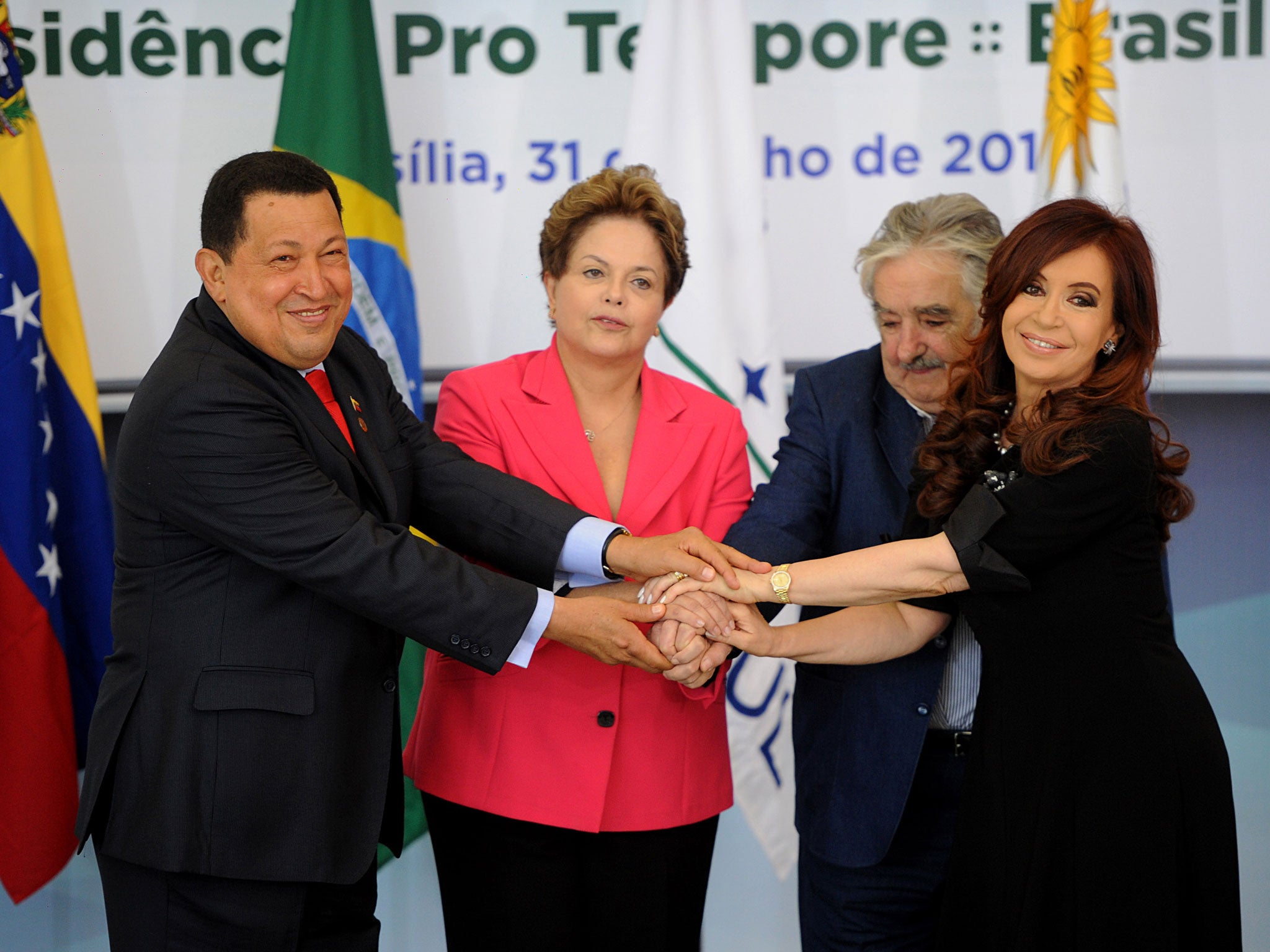Chavez is gone, but have we seen the last Chavista?
The Venezuelan Presidents influence in the Americas during his life time is indisputable, but to what extend will it live on after his death?


Whether loved him or loathed him; whether you denounced him as a posturing socialist demagogue and mischief-maker, or lauded him as a great Latin American patriot with his people’s interests at heart - one thing was sure. There was never any ignoring Hugo Chavez’ impact, not just on Venezuela but on regional and hemispheric politics as a whole.
Wrapping himself in the mantle of Simon Bolivar, the revolutionary leader of the early 19th century who led the fight for independence from the Spanish empire, Chavez led his own battle to free his country and region from what he saw as the hegemony of the neo-liberal, neo-colonalist superpower north of the Gulf of Mexico.
'Chavismo'
Even before he was elected Venezuela’s president in 1999, Chavez approach was defined by his hostility to the United States. Latin America – with some justification – has always been susceptible to that condition, and rarely more so than in the first years of Chavez’ rule. But with the possible exception of Fidel Castro, no leader in the region carried it to the heights he did.
His politics, a blend of socialism, populism, authoritarianism and nationalism, became known as ‘Chavismo,’ his followers were ‘Chavistas.’ His goal was what he called the ‘Bolivarian revolution.’ In foreign policy terms, that meant a dual strategy, of ‘Latin America first’ and “my enemy’s enemy is my friend” (the enemy of course being the Yanqui imperialist.) To advance this strategy, he used Venezuela’s greatest source of wealth and power, its oil.
That second rule of thumb basically explained Chavez’ forays outside the Americas: his establishment of an anti-US ‘Axis of Unity’ with Iran, his support for the Gaddafi dictatorship in Libya and most recently for Bashar Assad’s regime in Syria. Anti-Americanism drew Venezuela close to Moscow, and led him to denounce Israel – with whom Chavez broke off diplomatic relations after the 2008/9 war in Gaza – as a “genocidal state” and the “assassin arm of the United States.”
My enemy's enemy
If Washington deemed a state an international pariah or a terrorist threat, the safe assumption was that Chavez’ Venezuela would embrace it. These controversial policies, often no more than fiery speeches at the UN and reciprocal lavish state visits, probably had little practical impact on events, other than to infuriate Washington and over time alienate even some of Chavez’ natural allies closer to home. But in the region it was another matter.
Venezuela might have been only the fifth most populous country of Latin America, after Brazil, Mexico, Argentina and Colombia, its immediate neighbour with whom Chavez repeatedly clashed. But Chavez would say out loud what many others dared not.
His readiness to tweak the US tiger’s tail won him admirers, especially after the failed coup against him in 2002, in which Washington, not very convincingly, denied any involvement. Just as for Castro in Cuba, American hostility enabled him to play the nationalist card, consolidating his support not only at home.
In Cuba
And it was over Cuba where Chavez’ impact was greatest. The billions of dollars of aid he gave the island, much in the form of heavily subsidized oil, may have been the difference between survival and collapse for the Communist regime. Over time a pattern developed, as oil-rich Venezuela under Chavez emerged as the leader of the poorer and more leftist countries of region: not just Cuba, but Nicaragua, Ecuador, Bolivia, and some Caribbean island nations.
The bloc took formal economic shape in 2004 with the creation of ALBA, the ‘Alternativa Bolivariana para las Americas,’ set up to as a rival to the orthodox, free trade areas in the hemisphere. But it wasn’t just the ALBA members who didn’t want to offend Chavez: his wont to give contracts to non-US companies won him a hearing with the region’s richer countries too.
By the time of his illness, however, his influence even in Latin America had waned. One reason was the decline in his physical powers. Another was the arrival of a new administration in Washington: Despite evidence that Venezuela was even abetting drugs trafficking into the US, Barack Obama struck a less confrontational note than his predecessor. For much the same reason, US relations with Brazil and Argentina have been smoother, offering Chavez less leverage. At the same time, left wing governments aligned with Venezuela have run into difficulties.
The last 'Chavista'?
And not least, the regional economic climate has changed. The appeal of ‘Chavismo’ was never greater than after the Latin American financial crises of the late 90s, culminating in Argentina’s 2001 default, seeming proof of the failure of the Western-style capitalism excoriated by Chavez. As it is, the last remotely ‘Chavista’ leader elected was Argentina’s Cristina Kirchner in 2007.
But his influence will surely outlive him. Chavez, wrote Larry Birns and Frederick B. Mills of the authoritative Washington based Council for Hemispheric affairs earlier this month, was “one of the giant Latin American figures of this age…..If Washington is looking for the good old days in Venezuela, it’s just not going to happen.”
Join our commenting forum
Join thought-provoking conversations, follow other Independent readers and see their replies
Comments
Bookmark popover
Removed from bookmarks